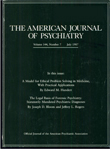Impaired memory for elements of the traumatic experience is a core feature of posttraumatic stress disorder (PTSD), and clinical complaints of memory impairment for non-trauma-related stimuli are common. Several studies (
1–
6) have documented generalized memory impairment among patients with combat-related PTSD. The underlying mechanism is unknown, but some investigators (
7,
8) have implicated stress-induced damage to limbic-temporal lobe structures. However, the etiologic role of stress in learning and memory impairments is clouded by high rates of comorbid psychiatric illness and substance abuse. Ultimately, the relationship between PTSD and memory functioning may be best understood by studying alternative patient groups with fewer comorbid disorders. In this study we examined the hypothesis that patients with rape-related PTSD would demonstrate memory impairments similar to those of patients with combat-related PTSD.
METHOD
Three groups of subjects participated in the study: treatment-seeking rape survivors from a rape crisis center, either with PTSD (PTSD-positive patients, N=15) or without PTSD (PTSD-negative patients, N=16), and nontraumatized comparison subjects (N=16). After complete description of the study to the subjects, written informed consent was obtained. A diagnosis of current PTSD was made if the symptoms met the diagnostic criteria of the Structured Clinical Interview for DSM-III-R (SCID) (
9) and the subject received a score higher than 107 on a modified version of the Mississippi Scale for Combat-Related PTSD (
10). The comparison subjects were matched to the PTSD-positive patients on age, education, handedness, and gender on a case-by-case basis. The exclusion criteria were history of head injury, blackouts, seizures, hallucinations, delusions, use of antipsychotic or stimulant drugs, or prerape treatment for psychiatric illness or substance abuse.
Comorbid anxiety disorders, depression, and substance abuse were assessed with the SCID (
9), Beck Depression Inventory (
11), and modified Michigan Alcoholism Screening Test (MAST) (
12), respectively. The California Verbal Learning Test (
13) was used to quantify immediate free recall over five trials (amount learned), slope of the learning curve (learning efficiency), short-delay (3-minute) and long-delay (20-minute) recall (ability to retrieve newly learned information with or without category prompts), number of words discriminated from distractors (recognition memory), and semantic (category- or meaning-related) and serial (order of presentation) clustering measures of encoding strategy.
The average subject was 27.7 years old (SD=6.9, range=19–44) and had 14.9 years of education (SD=1.8, range=12–18), and there were no significant between-groups differences. All but one of the sexually assaulted subjects were female. The average time since assault was 6.2 years (SD=5.3, range=1–20). Bidirectional hypotheses were tested by analysis of variance (ANOVA), and a conservative 0.01 alpha level was used to help control for the effect of testing multiple dependent variables. When appropriate, Tukey post hoc analysis followed the ANOVA procedure. The scores on the Beck Depression Inventory were treated as a covariate to assess the impact of depressive symptoms on memory.
RESULTS
The PTSD-positive group reported more depressive symptoms than the other two groups, and over one-half of the PTSD-positive group (53%, N=8) had moderate or severe levels of depression, compared to about 6% of the PTSD-negative group (N=1) and 0% of the nontraumatized subjects (N=0) (F=14.3, df=2,44, p<0.01). No between-groups difference was noted in scores on the modified MAST (F=0.96, df=2,44, p=0.39). The PTSD-positive and PTSD-negative groups did not differ in rates of anxiety disorders. Thus, the current design controlled for comorbid anxiety disorder (by including a comparison group with equivalent rates) and for alcohol use (all groups reported very low rates). The groups did differ in level of depressive symptoms, which was addressed statistically.
On the California Verbal Learning Test indices, the performance of the PTSD-positive group was worse than that of the other two groups on number of words learned (F=4.82, df=2,44, p=0.02) and short-delay free recall (F=3.63, df=2,44, p=0.03). While these differences did not attain the adjusted alpha level of statistical significance, they do represent a clear trend toward worse performance by the PTSD-positive individuals on these measures of short-term memory. This interpretation is consistent with the significant impairment of the PTSD-positive subjects in long-delay recall (F=5.74, df=2,44, p<0.01). Post hoc analysis indicated that the PTSD-positive subjects recalled fewer list items than did the PTSD-negative and comparison groups. When category cues were provided to the subjects, the recall difference declined to a nonsignificant level (F=3.75, df=2,44, p=0.03). No between-groups difference was observed in recognition hits (F=0.63, df=2,44, p=0.54). No differences in learning strategy were apparent, as the three groups had similar scores on the semantic and serial clustering indices.
Beck Depression Inventory scores treated as a covariate did not account for a significant proportion of the variance in delayed-recall scores (F=0.05, df=1,43, p=0.83), and significant group differences remained (F=4.69, df=2,43, p<0.01). The depression scores accounted for only 5.9% of the variance in recall scores. Thus, concomitant depression explained an insignificant proportion of the variance in delayed recall.
DISCUSSION
Memory disruption in combat veterans with PTSD is difficult to interpret owing to high rates of other psychiatric disorders and substance abuse. The current study demonstrated that PTSD-positive subjects without comorbid alcohol abuse have impaired free recall. This is similar to the results reported for veteran groups (
5,
6,
8).
Compared to normative standards for age and education, one-third of the PTSD-positive group fell at least two standard deviations below the mean for delayed free recall; fewer than 5% of the members of the other two groups were this impaired. Overall, the PTSD-positive group scored in the mild to moderately impaired range when compared to normative standards. It is unclear whether poor memory for personally irrelevant information is related to the loss of memory for elements of the traumatic experience; this issue should be the focus of future studies.
Another issue is whether the memory impairment is secondary to attentional impairment. Poor immediate free recall suggests attentional deficits, which have been documented in combat veterans (
2–
5). Further study of the relationship between attentional and memory functioning in groups with rape-related PTSD and with combat-related PTSD is needed.

